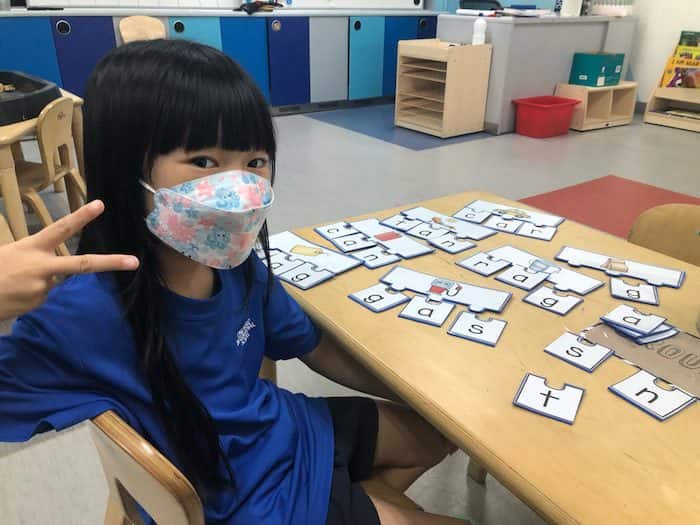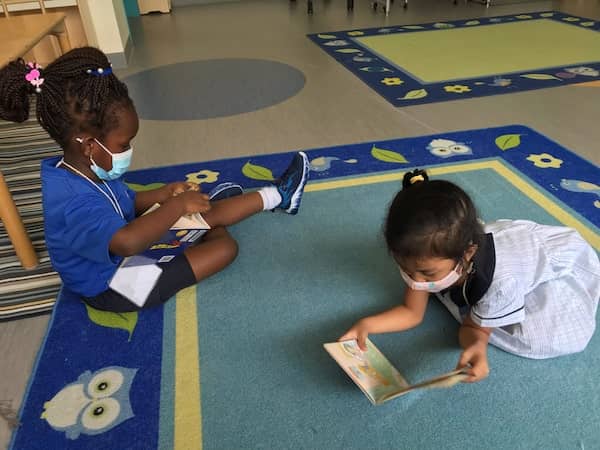A solid foundation in English and Maths is essential for your child’s success. These two subjects equip children to master future educational goals, accomplish daily living tasks and function in the global 21st-century society. The Early Childhood programme at OWIS Nanyang is among the leading preschool programmes in Singapore and features a strong English and Maths curriculum. Our play-based and inquiry-led approach, which is aligned with the IB Primary Years Programme (IB PYP), allow your child to have fun as they discover, investigate and interact with engaging content. Let’s explore the foundational principles your child will learn in our top-rated kindergarten and Early Childhood programme.
Language Skills
Children use language skills to communicate and exchange information in a meaningful way. The ability to put words together in a sentence, comprehend and understand word meanings, and follow directions are all essential life skills.
Language skills form the foundation for successful learning throughout life, too. Children need language in order to read, write and develop literacy. Language also equips children to manage behavioural expectations and navigate social situations.
Our programme offers a child-centric and play-based approach that makes learning fun. We also implement differentiated learning and personalised instruction, enabling children to learn at their own pace.

Consider the language skills your child will learn in their English language classes in Early Childhood at OWIS:
Reading:
- Phonics – letter sounds, CVC words, long vowel sounds, digraphs and basic sight words
- Skills for decoding new words using letter-sound knowledge
- Basic reading comprehension – Recognise the main events in a story, comment on interesting aspects and recognise who is telling the story
Writing:
- Writing uppercase and lowercase letters
- Spelling simple words phonetically
- Simple sentences
- Simple grammar and punctuation
- Correct formation of letters and numbers
Speaking and Listening:
- Use spoken language to describe what they are doing or are feeling
- Listen for increasing periods of time to their teacher, each other and stories
- Share ideas about stories with classmates and the teacher
Viewing and Presenting:
- Talking about pictures and messages
- Age-appropriate handwriting and presentation skills
Maths Skills
Children use Maths in dozens of academic and practical ways. The Maths skills children learn during early childhood equip them to advance to higher Maths throughout their educational career. By equipping maths skills in the early years, it will help children problem-solve, measure and develop their own spatial awareness and teach them how to use and understand shapes.
Beyond academics, Maths helps children understand their world. For example, Maths concepts encourage children to see spatial relationships and the connections and functionality of natural wonders. Children also develop problem-solving skills as they learn Maths facts.
OWIS’ Early Childhood grades introduce young children to the intriguing world of numeracy in a no-pressure environment. Through a child-centric approach and differentiated learning, your child gains a personalised educational experience, thus enabling the child to make decisions and solve problems

By the time they are ready to leave Early Childhood 3 and step into Primary Grade 1, these are some of the skills preschoolers would have learned in our engaging Maths lessons:
Numbers:
- Understanding of place value
- Knowledge of the number system reciting, ordering and comparing numbers up to 50
- Skip counting
- Addition and subtraction including number bonds to 10
- Halves and quarters in basic fractions
Pattern and Function:
- Odd and even numbers
- Patterns using words, drawings, symbols, materials, actions and words
- Making predictions and suggesting extensions
Measurement:
- Using ‘heavier than’, ‘shorter than’
- Difference between non-standard and standard units in length, weight, height and capacity
Shape and Space:
- Difference between 2D and 3D shapes
- Simple symmetrical patterns
- Position and direction
Data Handling:
- Sorting and labelling
- Tally marks
- Basics of pictograms
Socio-Emotional Skills
Along with literacy, language and Maths skills, Early Childhood learners learn the basics of Mandarin, start to explore Science and Social Studies concepts through Units of Inquiry, and benefit from balanced development through Music, Art and Physical Education lessons. Our experienced educators, who model our core value of kindness, also endeavour to nurture social-emotional skills, such as:
- Listening to others
- Speaking clearly
- Respecting others
- Using previously acquired knowledge in practical or new ways
- Asking ‘what if’ questions
- Thinking of new ideas
- Practising age-appropriate gross and fine motor skills
- Interpreting visuals and multimedia
- Asking questions, observing and noticing details

To learn more about OWIS, the leading international school in Singapore for Early Childhood development, schedule a virtual tour. We give your child a strong foundation that prepares them to achieve their full potential throughout life.
This blog was originally written in collaboration with Karel van der Linden, former Head of Primary School and Early Childhood, OWIS Nanyang.














